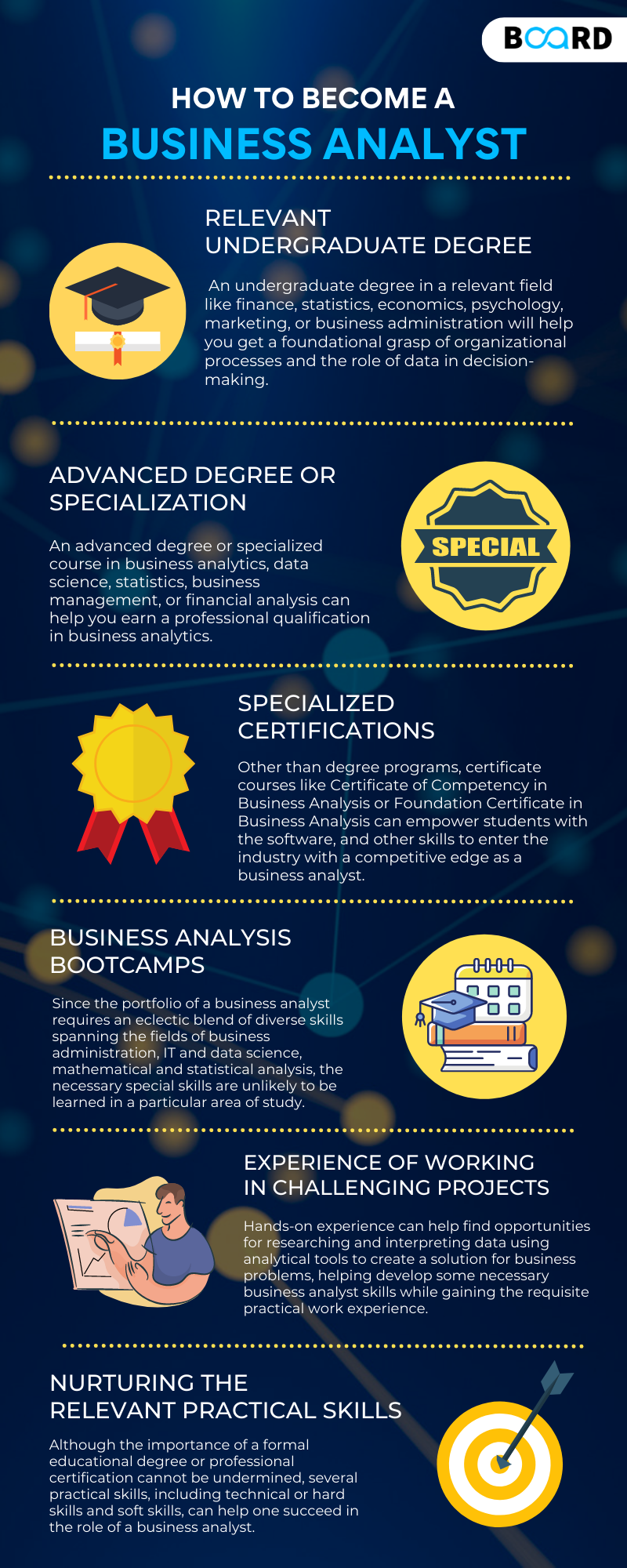
Business analytics is a scientific discipline combining data analytics, computer programming, and business intelligence to conduct research and find practical solutions to improve the current processes and systems of a business. It involves gathering, studying, analyzing the vast pool of data available to make informed business decisions to increase efficient business processes and maximize revenue.
Regardless of size or scale, almost every business today is turning to professionals with analytical tools to generate insights and formulate innovative solutions to business problems. The pandemic has also ensured that businesses have become increasingly reliant on data to devise strategies for their future growth.
Let’s look at the steps one needs to keep in mind while planning for a career as a business analyst in 2023.
Steps to Become a Business Analyst in 2023
1. Relevant Undergraduate Degree
Having an undergraduate degree helps set up a solid foundation for a career as a business analyst. Although an undergraduate degree in any discipline is suitable, having one in a related domain of knowledge like finance, statistics, economics, psychology, marketing, or business administration can help you get a foundational understanding of the processes of an organization as well as of the role of data in decision-making.
However, even if one comes from a relatively unrelated background, the ability to gain practical skills outside the domain of formal education can also be of immense value. In some cases, a candidate with an MBA (Masters in Business Administration) degree may also be preferred by employers for the added exposure that the program gives.
2. Advanced Degree or Specialization
You can gain a professional qualification in business analytics through an advanced degree or specialized course in business analytics, data science, statistics, business management, or financial analysis.
These specialized courses enrich one’s comprehensive knowledge about the theoretical underpinnings of running and managing a business. The general duration for these specialized courses is one year. These courses can help a candidate acquire the necessary skills for a business analyst position at a higher or management level.
3. Specialized Certifications
Other than degree programs, certificate courses like Certificate of Competency in Business Analysis or Foundation Certificate in Business Analysis can empower students with the requisite statistical, software, and other skills to enter the industry with a competitive edge as a business analyst.
These focused, short-term courses are designed keeping in mind the practical aspects of the job of a business analyst and aim to develop the qualities and skills needed to become a successful business analyst.
4. Business Analysis Bootcamps
Since the portfolio of a business analyst requires an eclectic blend of diverse skills spanning the fields of business administration, IT and data science, and mathematical and statistical analysis, the necessary special skills are unlikely to be learned in a particular area of study.
So, there should be retraining through business analysis bootcamps to stay on top vis-à-vis the requisite critical skills in the context of rapid technological advancements and changing business environment.
The Business Intelligence using Power BI Course by Board Infinity are among the many upskilling courses to provide budding business analysts with the necessary skills to leverage data analysis and data visualization to solve business problems.
Check out our post about Board Infinity’s in-demand job-oriented short-term courses to get a competitive edge while landing your dream job.
5. Experience of Working in Challenging Projects
Hands-on experience can help find opportunities for researching and interpreting data using analytical tools to create a solution for business problems, helping develop some necessary business analyst skills while gaining the requisite practical work experience.
People who can create opportunities for self-learning by volunteering and taking up challenging projects can assimilate and master a varied range of skills much more quickly than those who wait for the right opportunity to knock on their door. It is essential to have a proactive, problem-solving attitude and step outside one’s comfort zone to get the diversified kind of exposure and knowledge of every aspect of business required for a career as a successful business analyst.
6. Nurturing the Relevant Practical Skills
Although the importance of a formal educational degree or professional certification cannot be undermined, several practical skills, including technical or hard skills and soft skills, can help one succeed in the role of a business analyst. Some of these include but are not limited to:
- Business Understanding and Commercial Awareness about the industry concerned are prerequisites for a business analyst to properly understand the business operations and processes. For a business analyst, it is indispensable to be thoroughly updated about the latest trends as far as the market forces, government policies, tax laws, and competitor analysis is concerned.
- Impeccable Domain Knowledge can help business analyst develop their independent perspective about diverse business problems and contribute in a better manner to charting out their solutions.
- Technical know-how can help a business analyst develop technological tools and advancements like an automated process to make business processes more efficient.
- Knowledge of Common Programming Languages like R and Python is instrumental in solving complex problems and accelerating the speed of data analysis.
- Hands-on Experience in SQL and other Relational Databases like MySQL, Oracle DB, SQLite, and Microsoft SQL Server is crucial for data storage, manipulation, retrieval, and analysis.
- Expertise in using Programs like MS Excel can help one record and present data in a systematic and tabular form. Interpretation and presentation of data in the form of an Excel sheet can help provide a ready reckoner of quantitative information for actionable insight by the management.
- Statistics and Data Management Skills can help a business analyst to utilize statistical tools to help generate dynamic reports by studying unstructured company data and market information to formulate descriptive, predictive, and prescriptive business analytics.
- Proficiency in Data Modeling, Interpretation, and Data Visualization can help business analysts distill highly technical or unstructured raw data into presentable reports for decision-making by business owners or stakeholders. Being skilled at creating interactive reports using various business intelligence tools like Tableau, QlikView, and PowerBI.
- Interest in Project Management Techniques can help a business analyst prioritize tasks and track the progress of a project.
- Analytical Skills like competitive analysis can help a business analyst gain insight into the increasingly competitive market space. It is essential to understand and uplift basic business functions using analytical tools like business metrics, market research, competitive analysis, etc., to get an edge over one’s competitors.
- Problem-Solving Skills help a business analyst think logically and critically to solve a challenging business problem.
- Strong Interpersonal and Negotiation Skills can help a business analyst build positive relationships with clients leading to customer satisfaction and ensuring a profitable deal for one’s organization. A business analyst needs to share a good rapport with people both within and outside the organization to create an atmosphere of collaborative and cooperative interdependence crucial for successful business operations.
- Excellent Communication Skills (verbal and written) are necessary to have fruitful interactions, carry out documentation and correspondences, deliver compelling presentations and break down highly complex data into understandable project reports.
- Time Management and Organizational Skills can help a business analyst achieve the organization’s goals in a time-bound and result-oriented manner by juggling multiple complicated tasks efficiently and effectively through one’s impeccable organizational skills.
- Leadership and Management Skills help a business analyst understand the organizational needs and objectives and develop lucrative solutions to lead the organization towards achieving those objectives. It involves the ability to work both with and as leaders within an organization.

Conclusion
The role of a business analyst for any organization striving to remain competitive in the modern world cannot be overemphasized, especially in today’s digital age. One gets to develop and nurture an eclectic range of skills while carving a career for themselves in the business analyst job.
According to industry standards, the excellent compensation for the business analyst profile makes it one of the top 6 Highest Paying Jobs in India for Freshers.
Most importantly, it is essential to understand whether you are passionate about taking up this highly challenging yet intellectually stimulating professional role. If you love strategizing and problem-solving and your dream job is leading a data-driven quest for organizational excellence, a promising and futuristic business analyst job is the perfect career choice for you!
